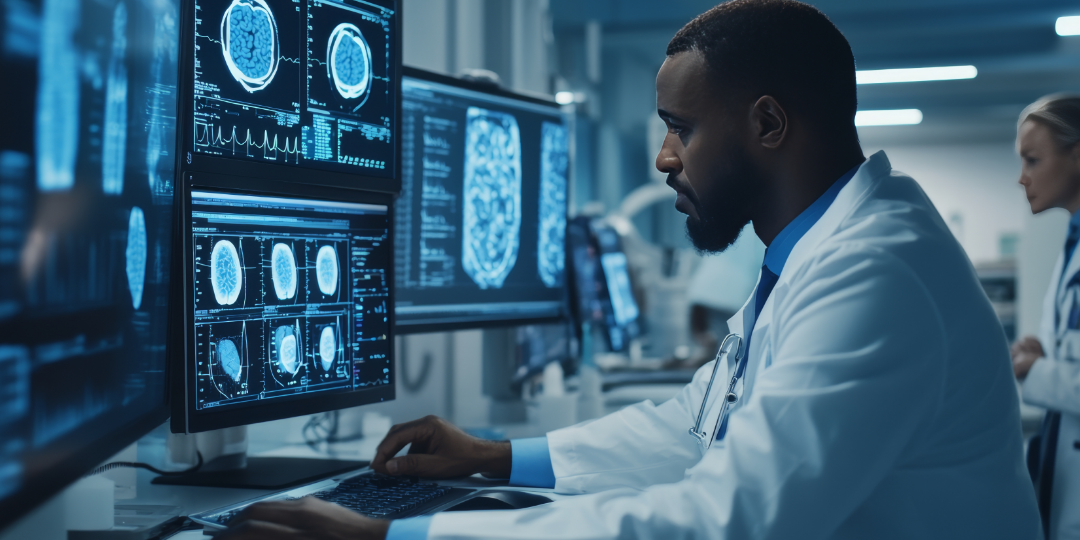Artificial intelligence (AI) is rapidly transforming many sectors, and healthcare is no exception. While much of the focus tends to be on AI’s role in clinical settings, a revolution is also taking place in medical laboratories. AI technology is being leveraged to enhance diagnostic accuracy, streamline clinical workflows, and improve patient outcomes. From advanced imaging systems to predictive models and data management tools, AI is helping medical professionals and researchers make more informed decisions. As it continues to evolve, the uses of AI in medicine are expected to grow, offering the potential for more personalized, precise, and efficient patient care.
Table of Contents
1. AI-Driven Diagnostics and Imaging
One of the most exciting areas where AI has shown promise is in medical diagnostics, particularly in imaging. Traditional medical imaging, such as X-rays, CT scans, and MRIs, has long been an integral part of patient care. However, manually analyzing these complex images can be time-consuming and prone to human error. This is where AI-powered systems, particularly deep learning models and neural networks, come into play.
AI technology has allowed medical imaging to evolve from a manual process to one that’s enhanced by AI systems capable of automating image analysis. AI algorithms can be trained to identify subtle patterns and abnormalities in medical images that might be overlooked by the human eye. By leveraging machine learning, these AI tools can analyze imaging data with high accuracy, assisting medical professionals in diagnosing a range of conditions—from cancer to neurological disorders. This process improves the efficiency of diagnostic workflows and enhances the overall precision of patient care.
AI-assisted diagnostics are particularly useful when it comes to detecting diseases at early stages. For example, AI-based imaging systems have been increasingly used to detect early-stage cancers—particularly breast, lung, and skin cancers—with remarkable accuracy. This capability is a game-changer, as early detection often results in better treatment outcomes and a higher rate of survival.
2. AI in Predictive Medicine
In recent years, the use of AI for predictive modeling in healthcare has gained significant traction. Predictive AI technology can process vast amounts of data to forecast the onset of diseases before they fully manifest. By assessing risk factors, genetic predispositions, and lifestyle choices, AI tools help healthcare professionals intervene proactively, allowing for early detection and preventative treatment.
In laboratory settings, predictive analytics can play a crucial role in fields such as genomics and epidemiology. AI systems use complex algorithms to process genetic and molecular data, identifying patterns associated with diseases and predicting their likelihood in individual patients. For example, AI systems can analyze a patient’s genome to predict susceptibility to diseases like breast cancer or heart disease, allowing for early intervention.
3. AI-Enhanced Laboratory Automation
Laboratories, particularly in research settings, generate massive amounts of data that need to be processed and analyzed. Manual analysis can be labor-intensive, time-consuming, and prone to human error. AI-driven automation is helping to streamline many aspects of laboratory workflows, from sample analysis to data interpretation.
For instance, AI-based systems can process data faster than humans, identifying trends and patterns in laboratory test results that may not be immediately obvious. These systems can also eliminate human error in routine tasks like blood sample analysis or data entry, ensuring that test results are more reliable and accurate.
AI-powered lab automation tools are being integrated into many medical laboratories, enhancing operational efficiency while maintaining a high level of accuracy in test results. Machine learning algorithms can learn from historical data and improve over time, optimizing laboratory practices and workflows. This process not only saves time but also helps laboratory professionals focus on higher-level tasks that require human expertise.

4. Improving Mental Health through AI in the Laboratory
While much of the focus of AI in healthcare has been on physical conditions, AI’s potential to revolutionize the mental health field cannot be ignored. In laboratory research, AI technologies are being employed to analyze behavioral data, identify biomarkers related to mental health disorders, and predict mental health crises before they occur.
For example, AI-enabled tools are being used to analyze neuroimaging data, uncovering insights into the underlying causes of mental health disorders such as depression, anxiety, and schizophrenia. These tools can help researchers identify new biomarkers and develop more effective treatments, offering patients better care options tailored to their specific needs.
Moreover, AI algorithms are increasingly being used to analyze patient data from wearable devices, such as smartwatches and fitness trackers, to detect changes in behavior or mood that might indicate the onset of mental health issues. This real-time analysis allows mental health professionals to intervene before a patient’s condition worsens, improving the overall effectiveness of mental health treatment.
5. AI in Laboratory Data Management and Workflow Optimization
In medical laboratories, one of the primary challenges is managing the vast amounts of data generated from tests, screenings, and clinical studies. AI tools are increasingly being used to automate data entry, ensure quality control, and optimize workflows.
AI-enabled data management systems can help streamline the collection, storage, and retrieval of patient data, reducing the likelihood of errors while improving the overall efficiency of the laboratory. These systems also assist with clinical decision support, offering insights into potential diagnoses and suggesting treatment options based on data analysis.
By integrating AI into laboratory workflows, healthcare providers can ensure that they are using their resources effectively, reducing waste and improving patient care. AI-based systems also help identify inefficiencies within laboratory processes, ensuring that each step of the process is streamlined and optimized. This not only results in faster, more accurate diagnoses but also reduces costs and enhances overall patient care.
6. AI-Assisted Drug Discovery and Development
One of the most promising applications of AI in laboratory medicine is in drug discovery and development. The process of developing new drugs is notoriously time-consuming and expensive, often taking years and billions of dollars to bring a new drug to market. AI-based platforms are helping to accelerate this process by analyzing vast datasets to predict which compounds are most likely to be effective in treating specific diseases.
Machine learning algorithms can sift through large volumes of data—ranging from chemical structures to biological responses and clinical trial outcomes—finding patterns that can guide the development of new therapies. These AI systems can also predict the safety and efficacy of potential drugs before they undergo costly and time-consuming clinical trials.
Moreover, AI can assist in optimizing drug formulations, predicting side effects, and identifying potential drug interactions. By accelerating the drug discovery process, AI technology can bring new, life-saving treatments to market more quickly, improving patient outcomes and advancing the practice of medicine.
Ethical Considerations and the Future of AI in Medicine
As AI continues to make its mark in laboratory medicine, it’s crucial to consider the ethical implications of its widespread use. One of the primary concerns is ensuring that AI systems are transparent, unbiased, and accountable. The data used to train AI models must be representative of diverse populations to avoid perpetuating healthcare disparities.
Moreover, as AI tools become more sophisticated, there’s a growing need for medical professionals to work alongside these systems, ensuring that human judgment remains a critical part of the decision-making process. AI should be viewed as an assistance tool, rather than a replacement for the expertise of healthcare providers. Its role is to augment human capabilities, not to supplant them.
Looking to the Future of AI in Medicine
Looking to the future, the integration of AI into laboratory medicine has the potential to revolutionize the way we approach healthcare. From improving diagnostic accuracy to optimizing workflows, AI is enabling more efficient, precise, and personalized care. While challenges remain, especially in terms of ethics and regulation, the future of AI in healthcare is undoubtedly bright.
As AI technology continues to evolve, the opportunities for innovation in laboratory medicine will only increase. The application of AI has the potential to redefine how we approach patient care, research, and healthcare systems as a whole. By embracing these advancements and addressing the associated challenges, we can move closer to a future where AI is seamlessly integrated into every aspect of medicine, improving patient outcomes and the practice of medicine as a whole.
